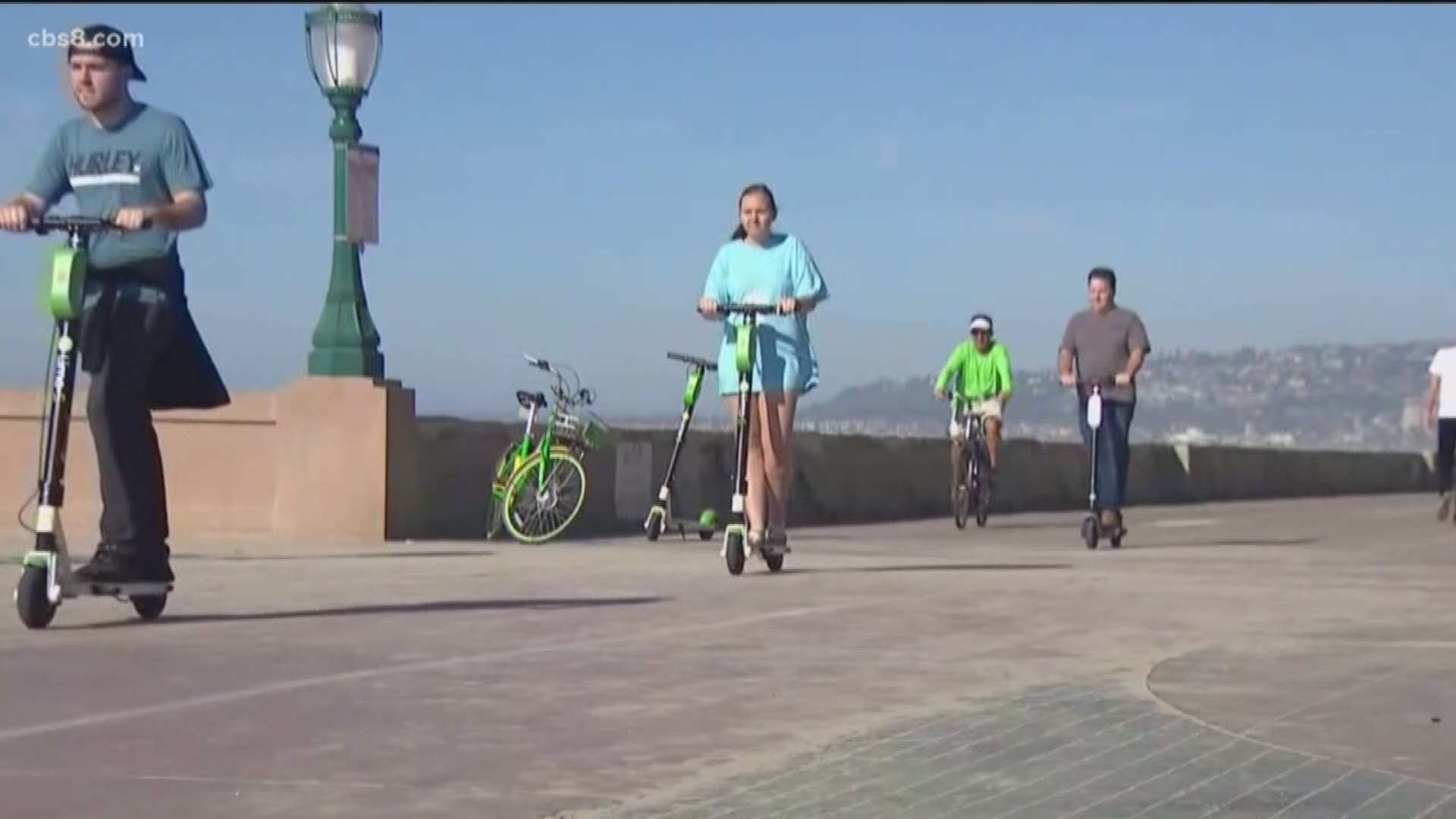SAN DIEGO — The San Diego City Council voted 5-4 Monday to tentatively approve a prohibition of dockless electric scooters on the city's boardwalks.
The ordinance would ban the use of motorized vehicles, not including motorized wheelchairs, on the Mission Beach and Pacific Beach boardwalks, Mission Bay Park Bayside Walk and the La Jolla Shores Boardwalk. The council also voted in favor of an amendment to the city's existing regulations of dockless motorized vehicles to reduce speed limits on the boardwalks from 8 mph to 3 mph.
City Council members Barbara Bry and Jennifer Campbell, who represent much of the city's coastal neighborhoods and favored the ban, argued that the boardwalks are Class One bike paths, meaning only pedestrians, bicyclists and people using non-motorized forms of transportation are allowed to use them.
"In the beach areas, there are physical streets and alleyways that can be used if someone indeed needs to travel on a motorized scooter for a transportation option," Bry said. "It's clear in light of public safety, government efficiency and state guidelines, approving this ban on the boardwalks is simple. There is no acceptable amount of injury or death."
At least one person -- a 48-year-old man in June -- has died from injuries sustained in a dockless scooter collision on the Mission Beach Boardwalk. That death occurred prior to the enforcement of the city's regulations, which went into effect July 1 and limited scooter speed limits on the boardwalk to 8 mph.
The council first approved the regulatory package for dockless scooters and other similar vehicles in April, more than a year after scooter companies like Bird and Lime made the devices ubiquitous around the city.
At the time of that vote, Bry and Campbell called for a full ban on scooter and motorized vehicle use on municipal boardwalks. The amendment package ultimately only included speed limits in high trafficked areas such as the boardwalks, Embarcadero and Spanish Landing.
In July, Bry went a step further and endorsed a citywide moratorium on dockless scooters due to safety concerns and the city's impoundment of a large swath of devices during Comic-Con weekend.
"Enough is enough -- scooter companies have had their opportunity," she said in a statement that month.
The proposal split the technically nonpartisan council's six Democrats, with City Council members Georgette Gomez and Chris Ward voting against. Ward suggested that approving the proposal could lead to more injuries and accidents due to scooter riders being compelled to drive on busy and unprotected surface streets.
"I am severely nervous that by doing so, we are going to shift more individuals onto Mission Boulevard, which is not set up" for pedestrian vehicle traffic, Ward said. "And then you, all of a sudden, have conflict with automobiles and that's where the deaths occur."
Ward also criticized the ordinance going straight to council and circumventing the committee process, where council members could have discussed the proposal and modified it if necessary. Gomez and City Councilman Scott Sherman argued that the regulations have already led to a decline in collisions and other accidents involving scooters and motorized vehicles.
"We need to finally just decide: is the boardwalk for pedestrians, or is it a bike path or what is it?," Sherman said. "Because that's really I think at the heart of the issue here and not coming up with a ban and trying to jump to a ban really quickly when we've only seen regulations in place for six months and we're starting to see good numbers from those regulations."
Last month, the council's Active Transportation and Infrastructure Committee approved a set of additions to the regulatory ordinance, including a rider curfew from midnight to 5 a.m. and increased measures designed to keep residents without a valid government ID from operating a dockless scooter or other similar device. The full council is expected to consider the amendments in early 2020.
The council is expected to hold a second, ratifying vote on the boardwalk ban in January. Unless at least one member of the council changes their vote from a "no" to a "yes," the ordinance would not have a veto- proof majority.

